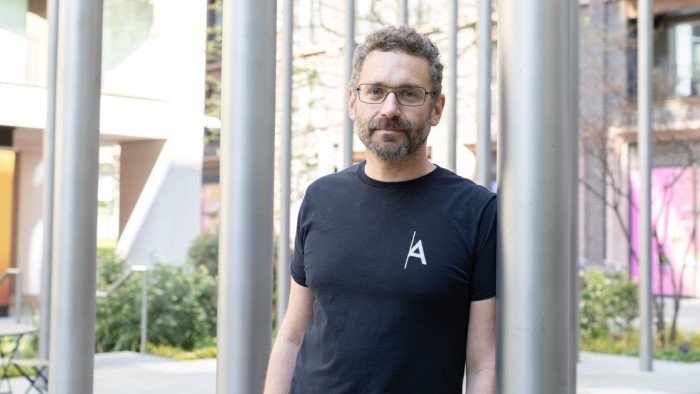Stay informed with free updates
Simply sign up to the Science myFT Digest — delivered directly to your inbox.
The biggest optimist about the UK I’ve recently met is Ilan Gur. Naturally, he’s American. His buoyancy may owe much to his fun job as the founding chief executive of the Advanced Research and Invention Agency (Aria), which has been disbursing £800mn of UK government money to fund moonshot science projects, ranging from dexterous robots to programmable plant life. It’s always easier to be intoxicated with the future than sober about the present.
Still, Gur makes a persuasive case that scientific innovation in Britain is like a “tightly wound spring that’s ready to release”. What most people have missed about Britain over the past decade, he tells me, is that there has been a dramatic change in the intensity of entrepreneurship within the scientific community, which ranks among the best in the world.
Britain today reminds him of an “explosive moment” at the University of California, Berkeley (where he studied for his PhD), when world-leading scientists embraced entrepreneurship some 10 to 15 years ago. The university shot up the leaderboard for high-value start-ups — as Britain can do today. “That excites me,” he says. “And I think it should excite more people here too.”
The best personification of the phenomenon is Sir Demis Hassabis, co-founder of the London-based AI start-up DeepMind — subsequently bought by Google — who last year won the Nobel Prize for chemistry. Gur reckons that Hassabis is probably unique in Nobel history for winning a prize at a company he founded. It is that mix of British scientific excellence and entrepreneurial drive that Aria is trying to bottle and replicate.
Aria was launched in 2023 to emulate the legendary Advanced Research Projects Agency, created in 1958 by US President Dwight Eisenhower to catch up with the Soviet Union following the launch of the Sputnik satellite. Later renamed Darpa, the US agency helped create the internet, GPS and mRNA-based vaccines, shaping the modern world. That makes it all the more tragic that the Trump administration is now intent on slashing many publicly funded research programmes.
In its spending review last week, the British government committed more than £1bn of additional funding to Aria in this decade. That is a tiny fraction of the $3tn that is spent globally on research each year. But Aria argues it can have an outsized impact on Britain’s longer-term economic growth prospects. By building entrepreneurship into its core model, it can multiply its bets on potentially game-changing research in consequential fields. Whereas venture capitalists may surf an innovation wave, Aria’s purpose is to generate the wave.
Like Darpa, Aria has appointed expert programme directors, each armed with £50mn-size cheques, to scope out opportunity spaces, including precision neurotechnologies, synthetic plants and climate cooling. They have already enlisted some impressive scientists from the UK and elsewhere to pursue these moonshot projects. But Aria is also collaborating with nine activation partners, including Google DeepMind and the US VC fund Fifty Years, to help commercialise breakthroughs. More than 40 per cent of Aria’s funding goes to start-ups and industrial companies to accelerate that process.
Aria’s approach accords with the latest thinking in metascience, or the science of science, which aims to bring a more evidence-based approach to research spending. Delegates from 61 countries are attending a metascience conference in London later this month to explore the most effective methodologies. What is unusual about Aria is that a public sector agency is largely being run as an unaccountable playpen, says James Wilsdon, executive director of the Research on Research Institute, which is hosting the conference.
The act of parliament that created Aria exempted the agency from much outside scrutiny. That gives it extreme operational flexibility, but it faces little accountability over how its money is spent. “The jury has to be out on Aria because we have no basis on which to come back and reach a verdict,” Wilsdon tells me.
With its high-risk, high-reward approach, Aria will surely lose money on some duff projects and its successes might only materialise in future decades. Paradoxically, its greatest short-term impact may come in changing perceptions as much as reality. Summarising a tortuous debate on research policy, a leading scientist once told me: “The best scientists go where they can do the best science.” If Aria really can persuade scientists that the UK is that place, Gur’s optimism may be justified.
john.thornhill@ft.com
